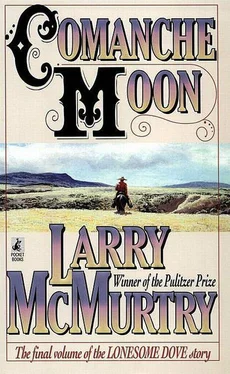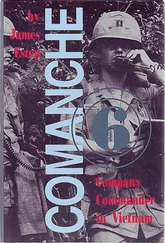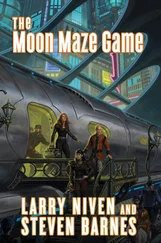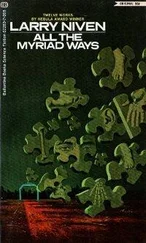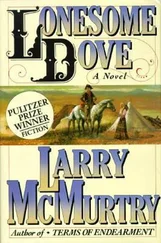He and Long Bill had been sincere friends, though, which is why he stood beside Deets to supervise the sawing of every plank and the driving of every nail.
"Billy was particular and he'd want to be laid out proper," Ikey said, when Call joined the group, which consisted of the entire ranger troop, such as it then was.
Augustus sat on one end of the wagon that was to haul Long Bill to his grave: he was silent, somber, and drunk. Deets put the coffin together meticulously, well aware that he was being watched by the whole troop. Lee Hitch and Stove Jones had spent a night of insobriety in a Mexican cantina; they were so hung over as to be incapable of carpentry. Stove Jones was bald and Lee Hitch shaggy--they spent their evenings in the cantina because they had ceased to be able to secure adequate credit in the saloons of Austin. Call noticed that neither man was wearing a sidearm.
"Where's your guns?" he asked them.
Lee Hitch looked at his hip and saw no pistol, which seemed to surprise him as much as if his whole leg were missing.
"Well, where is it, damn it?" he asked himself.
"I don't require you to swear," Call said. "We've a mission to go on soon and you'll need you your weapons. Where's yours, Stove?" Stove Jones took refuge in deep, silent solemnity when asked questions he didn't want to answer. He stared back at Call solemnly, but Call was not to be bluffed by such tactics, forcing Stove to rack his brain for a suitable answer.
"I expect it's under my saddle," he said finally.
"They pawned their guns, Woodrow," Augustus said. "I say just let them fight the Comanches with their pocketknives. A man who would sink so low as to pawn his own pistol deserves a good scalping, anyway." "It's not the Comanches," Call told him.
"It's Ahumado. He's got Captain Scull and he's offered to ransom him for a thousand cattle." "That lets me out--I ain't got a thousand cattle," Gus said.
"The state will buy the cattle. We have to deliver them and bring back the Captain," Call told him.
"Well, that still lets me out because I ain't a cowboy," Gus said. "I have no interest in gathering cattle for some old bandit. Let him just come and steal them. He can leave off the Captain if he wants to." Call noted that the coffin was almost finished. He saw no reason to pursue an argument with Gus at such a time. In his present mood Gus would easily find a reason to disagree with anything he might say. The men were all stunned by Long Bill's suicide. The best procedure would probably be to go on and hold the funeral, if the women were up to it. With no undertaker and no preacher, funerals were rude affairs, but they were still funerals. The womenfolk could sing, and the ceremony would draw the men away from the saloons for a few minutes. Once their old compa@nero was laid to rest there would be time to consider the matter of Ahumado and the thousand cattle.
"We don't have to worry about the mission right this minute," Call said. "We've got a month to deliver the cattle. Let's go see how the womenfolk are doing, while Deets finishes the coffin." "Nearly done," Deets said, wondering if he was expected to go to the funeral-- or if he would even be allowed to. He worked carefully on the coffin; one of the laundresses had brought over an old quilt to line it with.
Deets took special care to see that the lining was laid in smoothly. He knew that the spirits of suicides were restless; they were more likely than other people to float out of their graves and become spooks, harassing those who had offended them in life. He was not aware that he had offended Long Bill--he had helped him with quite a few chores, but all that might be forgotten if he then built him an uncomfortable coffin, a coffin his spirit could not be at rest in. Mr. Bill, as Deets had always called him, had rangered far in his life; it would be too bad if his spirit had to keep rangering, for want of a comfortable resting place.
"We ought to caulk this coffin, I expect," Ikey Ripple said, rendering his first judgment on the matter. The coffin was sitting on two sawhorses. He bent over and peered underneath it, an action that aggravated his rheumatism. It was a coffin that could profit from a good caulking, in his view.
"I doubt we have anything to caulk it with," Call said.
"It won't hold out the worms or the maggots no time, if we don't give it a caulking," Ikey insisted.
"Well, the store's closed, I don't know where we could get any caulking," Call said.
With the Forsythe store still out of operation, everyone in town was constantly discovering that they needed some small necessity which there was no way to procure.
"Billy Coleman was a fine fellow," Ikey went on. "He deserves better than to be bloated up with screwworms before he's hardly in his grave. The dern state of Texas ought to have some caulking, somewhere." Mention of screwworms at a moment of such solemnity made everyone queasy, even Call, for they had all seen the dreadful putrefaction that resulted when screwworms infested a deer or a cow. The thought that such might happen to Long Bill Coleman, a comrade who had been walking among them only yesterday, made everyone unhappy.
"Shut up talking about worms and maggots, Ikey," Augustus said. "Long Bill's just as apt to be up in heaven playing a harp as he is to be having screwworms infect him." Ikey Ripple considered the remark obtuse --and, besides that, it was made in an unfriendly tone, a tone particularly unwelcome for having come from a raw youth such as Gus McCrae. Ikey had passed his seventieth year and considered anyone under fifty to be callow, at best.
"I don't know what happens in heaven but I do know what happens when you stick a coffin in the ground that ain't caulked," Ikey said. "Worms and maggots, that's what." Deets had just finished the coffin lid, which fitted snugly.
"Ikey, stop your griping," Gus said.
"Plenty of our fine rangers have been buried without no coffin at all." "Them boards are thin--I expect the worms will get in pretty soon even if you do caulk it," Stove Jones observed.
"Worms and varmints--a hungry varmint will dig up a coffin unless it's buried deep," Lee Hitch added.
"You are all too goddamn gloomy," Augustus said. "I say let's bury Billy Coleman and go get soundly drunk in his memory." He got off the wagon and began to walk toward the Coleman house.
"I expect we'll just have to do without the caulking," Call said. "Just load the coffin in the wagon and bring it to the house. I believe it would be best to get this burying done." Then he followed Gus, who was walking slowly. Ahead, a knot of women stood around the back porch of the Coleman house. Call looked for Maggie but didn't see her at first.
When he did spot her she was not with the women on the porch--they were respectable women, of course.
Maggie sat alone on the steps going up to her rooms. She had her face in her hands and her shoulders were shaking.
"Mag's upset," Gus said. "I expect one of these old church biddies ran her off from the mourning." "I expect," Call said. "Maggie's close to Pearl. She took the arrows out of her after the raid, she said. The doctor was busy with the serious wounds." When Call walked over and asked Maggie if one of the ladies had been rude to her, Maggie shook her head. She looked up at him, her face wet with tears.
"It's just so hard, Woodrow," she said.
"It's just so hard." "Well, but there's easy times, too," Call said awkwardly; he immediately felt he had said something wrong. He could never come up with the right ^ws, when Maggie cried. His remark was true enough-- there were easy times--but the day of Long Bill's death was not one of them.
Not for me, Maggie wanted to say, when he mentioned easy times. She wanted to go be with Pearl Coleman, but she couldn't, because of her position.
Читать дальше
